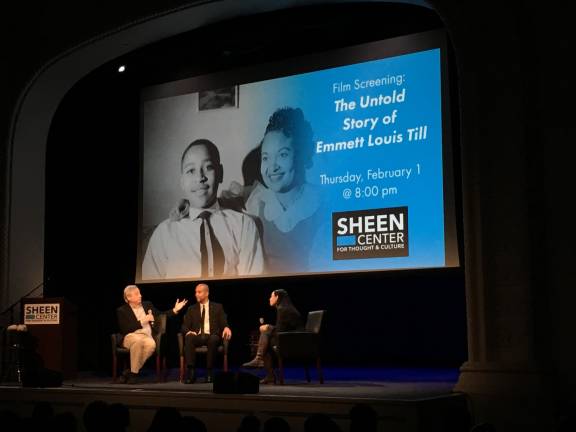Facilitating thought and talk

Some people think movies are add-ons, entertainments and infotainments we can take or leave; but some films have a real-world impact.
The Fulton J. Sheen Center for Thought and Culture, on Bleecker Street, opened its Black History Month programming with Keith Beauchamp’s 2005 documentary, “The Untold Story of Emmett Louis Till.” The film is about the 14-year-old black boy who, it was alleged at the time, whistled at a white woman store owner in Mississippi in 1955. Till was kidnapped a few days after the supposed incident and his mutilated body was found in the Tallahatchie River. The incident galvanized the nascent civil rights movement when Till’s mother insisted that her son’s coffin remain open at his Chicago funeral, and a gruesome photo was published nationwide.
Beauchamp found that there were still those alive who could be prosecuted and the FBI reopened the Till investigation as a result.
Some say the 63-year-old case has parallels in current-day America. There have been two recent Till books, reflecting ongoing interest in the incident.
Beauchamp’s film can be seen on YouTube and is the basis of an upcoming narrative film by producer Fred Zollo (“Mississippi Burning”), with Whoopi Goldberg making her directorial debut.
In an interview after a recent screening at the Sheen Center, Zollo said that he produces movies “to make people angry and committed.”
The film is a prime example of thought-provoking fare featured at the Sheen Center, which is named for the late Archbishop Fulton J. Sheen, widely known for his popular broadcast ministry. It is a project of the Archdiocese of New York with a stated mission to present “the true, the good, and the beautiful.”
The Center takes on tough, issues, such as a recent panel on suicide, where the Church’s well-known position was met with passionate discussion.
Acknowledging that the truth is sometimes ugly, an Archdiocese spokeswoman, Mercedes Lopez Blanco, said, “The truth is always beautiful, though the journey can be messy.”
Few subjects are as fraught as race, and on February 20, the Center will present “Race In America: Telling Our Stories” — an evening of conversation and readings with several authors and poets.
On February 22, audiences can experience “Little Rock,” an excerpted play reading and panel discussion. The script is based on the nine teenagers who desegregated a white high school in Little Rock, Arkansas, in 1957. Their stoicism in the face of noxious racism was televised for the world to see. The discussion will include a member of the Little Rock Nine. A full production will be at the Center this spring.
The final Black History Month presentation, on February 27, will be an author’s night featuring Fox News’ chief national correspondent Ed Henry. He’ll discuss his book, “42 Faith: The Rest of the Jackie Robinson Story.” It’s an inspirational take on the legendary player who broke Major League Baseball’s color barrier, and emphasizes how Robinson’s faith played a role in keeping him grounded as he faced widespread and sometimes brutal opposition.
The Sheen Center is housed in a Colonial Revival-style former school and rectory built in 1926. Beginning about 1945, it functioned as a shelter for homeless men. The Archdiocese was able to renovate its interior, which now includes a 270-seat theater. Live concerts can be recorded in the state-of-the-art studio, which boasts five-camera video capabilities. The smaller, 90-seat Black Box theater has moveable seats. There are four rehearsal spaces, and an art gallery.
The Center’s mission statement says “that life is worth living, especially when we seek to deepen, explore and challenge ourselves, Catholic and non-Catholic alike, intellectually, artistically, and spiritually.” In an online video, also played before presentations, the archbishop of New York, Timothy Cardinal Dolan, says many people who might never go to a church will come to see a play, a film or a panel. That is the Sheen Center’s genius.
The Center notes it is “cognizant of our creation in the image and likeness of God,” and its programming reflects that, including such offerings as a “celebration in music, dance and story of the Sisters of Charity of New York.” But there are also theatrical productions, like the current “Midsummer Night’s Dream.”
The Center is eclectically nonsectarian.
Beauchamp, the filmmaker, said he has additional material that was not included in his original telling of the Till story. After the screening, he emphasized that Till’s mother wasn’t acting alone; there were activists and leaders organizing. “History is repeating itself,” he said, and that’s what makes Till’s story resonate today.
Zollo said the people responsible for Till’s murder can still be held to account: “A movie can make a difference.” Which is exactly what the Sheen Center aspires to facilitate.